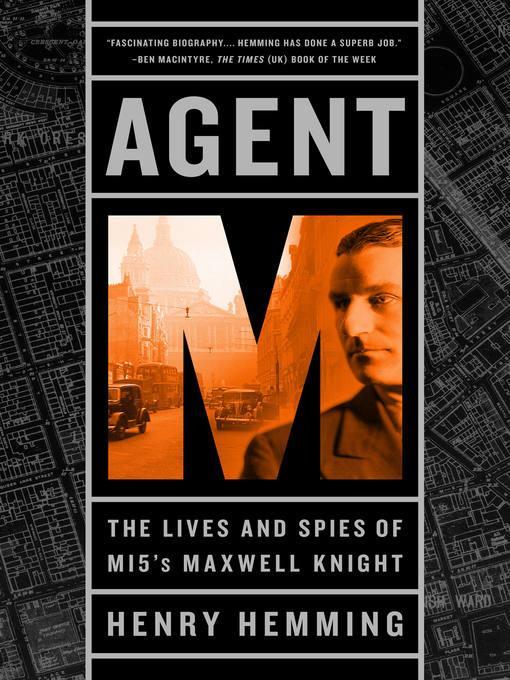
Agent M
The Lives and Spies of MI5's Maxwell Knight
کتاب های مرتبط
- اطلاعات
- نقد و بررسی
- دیدگاه کاربران
نقد و بررسی

March 20, 2017
British popular historian and biographer Hemming (The Ingenious Mr. Pike) revisits the life of Maxwell Knight in the first biography of the 20th century’s leading MI5 spymaster. Knight was an eccentric figure who “possessed an unparalleled ability to turn unqualified men and women—bankers, secretaries, lawyers, booksellers—into reliable and consistently productive agents.” During the 1920s and ’30s, Knight used this ability to infiltrate and render innocuous the British Fascist movement, under the leadership of first William Joyce (later Lord Haw-Haw) and then Oswald Mosley. Knight had for some years been attracted to fascism himself and might have tipped off his old friend Joyce that he was about to be apprehended before Joyce fled to Germany in August 1939. Hemming writes far more briefly about Knight’s less successful postwar effort, including his recruitment of John le Carré to identify communist infiltrations of British institutions. The book is clearly written and well researched, though Hemming occasionally stumbles, as when he gets distracted by the work of some of Knight’s less effective agents in the early 1930s. Still, this in-depth introduction illuminates a largely forgotten man of antidemocratic tendencies who played a key role in keeping Britain secure and democratic for much of the interwar and early postwar periods.

March 15, 2017
The dramatic story of the remarkable British spymaster who may have been the model for the James Bond character M.Maxwell Knight (1900-1968) recruited men and women who were quiet but intense, naturalists like him--though he was unlikely to find anyone as devoted to a wide variety of exotic animals. He looked for those who could work unnoticed, efficiently listening, remembering, and reporting what went on in communist and fascist organizations. Searching for a livelihood after World War I, Knight joined Sir George Makgill's private intelligence agency. Makgill worked for industrialists worried about labor unions and the rise of communism. Knight's first assignment was to join the British Fascists--which, in the 1920s, was not yet politically abhorrent--and to find potential recruits, an easy task given his mystical magnetism. At this time, he was friends with William Joyce, who would become, during World War II, the treasonous Lord Haw-Haw. They joined the paramilitary wing of the BF, where Knight learned the spy trades of kidnapping and his specialty, breaking and entering. In 1929, Knight was recruited by MI5 to fight communism, eventually leading the M Section. His -grey people- learned to become small and insignificant, remembering everything and hoping no one remembered them. Knight directed his people like he once ran his jazz band: moderating tempo, watching overall direction, and improvising when necessary. Hiring Anna Wolkoff to work as a secretary for the Communist Party was a stroke of genius, helping to break up a spy ring. Knight's M section was more right-wing, daring, more maverick than others. It was also the most independent, economical, and unconventional. Many spy stories are page-turners, but the author proves that the story of one man can be equally thrilling. Hemming has uncovered a man determined not to be known and in so doing, has provided us with delightful reading.
COPYRIGHT(2017) Kirkus Reviews, ALL RIGHTS RESERVED.

Starred review from May 1, 2017
Spymaster and broadcaster Maxwell Knight (1900-68) was reputedly a model for the James Bond character "M." In his latest work, Hemming (The Ingenious Mr. Pyke) unveils Knight's eccentricities in a clear narrative, detailing how a quirky individual rose through the British intelligence service, MI5, to become one of its top spymasters. Readers are transported to early 20th-century Britain, where the political spectrum faced threats from communists and fascists. Knight infiltrated these movements, successfully defeating British fascism before it took root on the Isles. With regards to communism, Knight was able to stop the Soviet theft of military plans. His reliance on women as undercover agents set a historic precedent. This worthwhile biography demonstrates Knight's remarkable contributions to history, and should be read alongside Ben Macintyre's Double Cross and Paul McMahon's British Spies and Irish Rebels. VERDICT Highly recommended for Anglophiles who want to learn more about the interwar period and those looking for a provocative read.--Jacob Sherman, John Peace Lib., Univ. of Texas at San Antonio
Copyright 2017 Library Journal, LLC Used with permission.

























دیدگاه کاربران